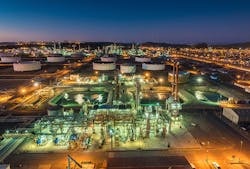State-owned Empresa Nacional del Petróleo (Enap) subsidiary Enap Refinerías SA has let a contract to Técnicas Reunidas SA to provide engineering, procurement, and construction (EPC) services for a series of new processing plants to be installed at Enap Refinerías Bío Bío’s (ERBB) 116,000-b/d refinery at Hualpén, in Chile’s Bío Bío region.
As part of the lump-sum turnkey contract, Técnicas Reunidas will execute EPC services for a wet gas sulfuric acid (WSA) plant, sour water stripping plant (SWS) and an amine recovery plant (MDEA), the service provider said.
Técnicas Reunidas’s scope of work under the contract includes delivery of engineering, equipment, materials supply, construction, precommissioning, commissioning, run tests and startup of the 140-tonnes/day WSA Plant plant equipped with technology licensing by Haldor Topsoe AS, the 1,600-cu m/day SWS Plant, and the 816-cu m/day MDEA plant.
Valued at about $100 million, the lumpsum turnkey contract—the largest project awarded by ENAP in the last 3 years—has a duration of 27 months, according to Técnicas Reunidas.
The recently awarded project for the Bío Bío refinery comes as part of Enap’s investment program to fulfill environmental regulations required by Chilean authorities to develop eco-friendly processes in the country’s refining sector, Técnicas Reunidas said.
In its latest annual report to investors, Enap said it has been preparing its operations especially for technological adjustments aimed at reducing emissions of particulate matter and greenhouse gases via execution and startup of projects, special emission abatement installations, and development of new qualities of fuels that comply with requirements related to policy changes and new regulations established by Chilean regulatory authorities to ameliorate climate change and enable the country’s transition to a lower carbon economy.
Alongside producing marine fuels complying with the International Marine Organization’s (IMO) Annex VI of the International Convention for the Prevention of Pollution from Ships (MARPOL Convention)—which on Jan. 1, 2020, lowered the maximum sulfur content of marine fuel oil used in ocean-going vessels to below 0.5%, down from a previous 3.5%--ENAP’s Bío Bío refinery has commissioned a wet gas scrubber as well as undertaken engineering for a similar unit at its 104,000-b/d Aconcagua refinery in Concón, Valparaíso, according to the operator’s 2019 annual report (OGJ Online, Apr. 30, 2018).
About the Author
Robert Brelsford
Downstream Editor
Robert Brelsford joined Oil & Gas Journal in October 2013 as downstream technology editor after 8 years as a crude oil price and news reporter on spot crude transactions at the US Gulf Coast, West Coast, Canadian, and Latin American markets. He holds a BA (2000) in English from Rice University and an MS (2003) in education and social policy from Northwestern University.

